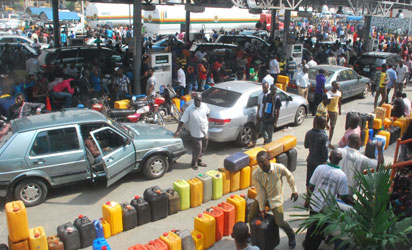…as gridlock becomes the order of the day on Lagos roads
The Fuel problem in Lagos and its environs is getting worse as long vehicular queues have now become common sights for people at various filling stations. This is accompanied by excruciating gridlocks on both major highways and inner roads.
Similarly, prices of some food items and transportation fares have jumped by about 50 percent as motorists blamed these on lack of fuel.
In most places outside Lagos, the price of fuel has escalated to an unexplainable price. In Port Harcourt fuel was sold in most filling stations at N950 per litre on Sunday. In Delta state, Ugheli, it was N90 per litre on Sunday and in Ijebu Ode it was N870 per litre.
The situation is not different in Lagos as the product now sells for between N800-N1,000 in some filling stations, a move that has increased the cost of transportation.
The worst aspect of the whole scenario is the fact that the fuel sold in many of the filling stations burns too fast, indicating that they are either adulterated or off-spec.
Some filling stations are not selling the product while black marketers have taken advantage of the situation to do brisk business.
The situation is not limited to Lagos. Some states in the northern region have experienced persistent scarcity of the product.
But in a bid to tackle the situation, the Federal Government through the Nigerian Midstream and Downstream Petroleum Regulatory Authority (NMDPRA) threatened to withdraw licenses of filling stations hoarding fuel.
“NMDPRA embarks on a war against the illegal sale of petroleum products, especially PMS in jerrycans. Filling stations are advised to desist from servicing illegal peddlers; failure to do so would result in the suspension of retail licences,” the agency said in a tweet on its handle.
The Nigeria National Petroleum Company Limited (NNPCL) last month blamed the scarcity of petroleum on a hitch in the discharge operations of a couple of vessels.
“The NNPC Ltd wishes to state that the tightness in fuel supply and distribution witnessed in some parts of Lagos and the FCT is a result of a hitch in the discharge operations of a couple of vessels,” the NNPCL spokesman Olufemi Soneye said.
But he assured Nigerians that the NNPCL is working to resolve the situation.
“Similarly, the development was compounded by consequential flooding of truck routes, which has constrained the movement of PMS from the coastal corridors to the Federal Capital, Abuja,” he said.
To mitigate the suffering of motorists, the Lagos State Traffic Management Authority (LASTMA) has deployed its officers to monitor traffic around filling stations.
LASTMA’s Director of Public Affairs and Enlightenment Department Adebayo Taofiq quoted the agency’s general manager Olalekan Bakare-Oki as warning motorists against obstructing the flow of traffic.
He said the deployment became necessary due to reports of long queues at filling stations caused by motorists who park indiscriminately, thus blocking roads.
“We want our roads to be free-flowing; fuel queues should not become a burden for other road users in Lagos,” the LASTMA chief said.

